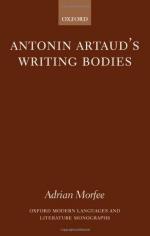|
This section contains 3,180 words (approx. 11 pages at 300 words per page) |

|
“Artaud's Use of Language, Sound, and Tone,” in Modern Drama, Vol. 15, No. 4, March, 1973, pp. 383-90.
In the following essay, Labelle discusses Artaud's use of sound, tone, pitch, and volume in his attempt to undermine conventional language and traditional theater.
“Oh, for a language to write drama in,” Eugene O'Neill wrote in 1929. “I'm so strait-jacketed by writing in terms of talk! But where to find that language?”1 His cry of frustration reiterated the feelings of one of his French contemporaries, Antonin Artaud (1896-1948). Although O'Neill failed to answer his question, Artaud, in his plays and poems, undertook a long series of experiments in language, sound, and tone in an attempt to develop new means of communication.
The Spurt of Blood (Le Jet de sang) (1925), a play which was the highpoint of his early period (1924-1931), demonstrates the subservient role Artaud assigned to language. The work is a montage of...
|
This section contains 3,180 words (approx. 11 pages at 300 words per page) |

|


